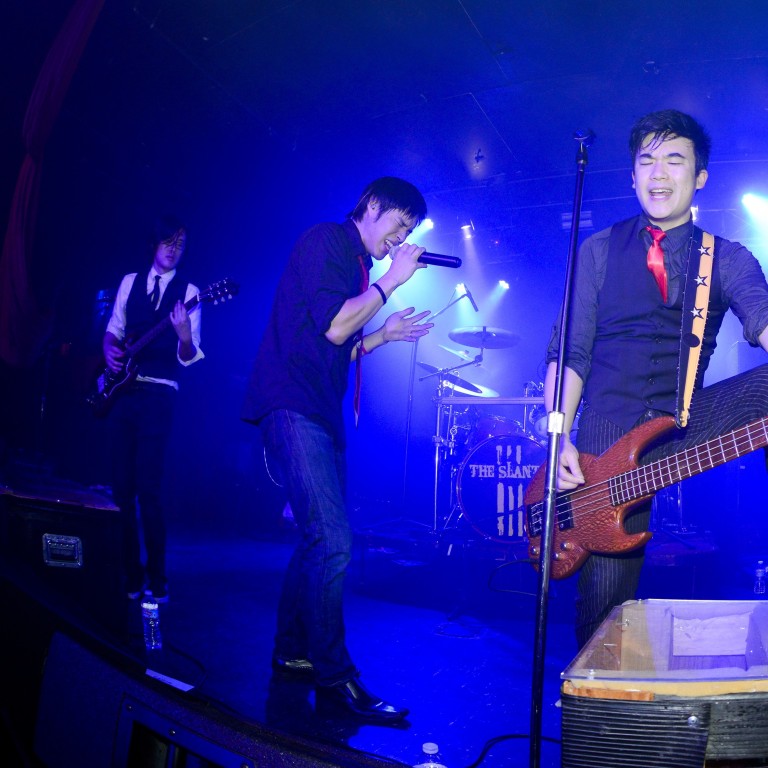
The Slants: Asian-American band who took the fight for their name to the US Supreme Court
- When ‘Chinatown dance rock’ group tried to trademark their name, little did they know it would begin a years-long legal battle
- ‘Art is a form of activism’ says founder and bass player Simon Tam, who uses music to champion the overlooked and under-represented
The curious case of The Slants is no ordinary underdog tale of Asian-American identity politics, infinitely nuanced trademark law, heated constitutional wrangling and defiantly catchy rock music. It’s far more complex than that. At first glance, the basic elements of a story that grew exponentially, from a legal formality into an incendiary debate at the Supreme Court of the United States, appear simple enough. Beneath the surface, however, is a rabbit hole of densely interwoven cultural issues that look set to be debated for generations.
The Slants are an Asian-American band from Portland, Oregon, founded in 2004 by Simon Tam, a bass player of Chinese and Taiwanese descent. The current line-up includes vocalist Ken Shima, whose heritage is Japanese, and guitarist Joe X. Jiang, who was born in Jinan, the capital of eastern China’s Shandong province. Tyler Chen joins them on drums for live performances. Their music is loud and lively, positioned midway between dance and rock, but their notoriety has more to do with the courtroom than the concert stage.
“In the beginning, when I started the group, I didn’t want to be politically active. I just wanted to play music,” says Tam, 38. As a young man, Tam could never have predicted that he would place himself at the heart of a national discussion about freedom of expression, civil liberties and First Amendment rights, but the essence of The Slants can be traced back to one particular afternoon at school in San Diego, Southern California, when, barely a teenager, he was victimised by bullies.
“They pushed me to the ground, started punching and kicking me, all while yelling out racial slurs. They kept calling me ‘Jap’ and ‘gook’ over and over again as they were kicking me. Finally I stopped and I yelled at them: ‘I’m a Chink. If you’re going to be racist at least do it properly.’ They just stopped and stared at me and they eventually walked away. And they left me alone for the rest of the year. That implanted something in me, into my DNA, that would probably be the birth of The Slants.”
There’s power in claiming an identity, saying: ‘You can’t use this against me. This belongs to me.’ When you are very deliberate and intentional about that, it can be very powerful
Impressed by the strong representation of Asian characters in Quentin Tarantino’s 2003 film Kill Bill: Volume 1, Tam chose a band name that allowed him to assert his heritage by upending a racial slur: “It showed me that there’s power in claiming an identity, saying: ‘You can’t use this against me. This belongs to me.’ When you are very deliberate and intentional about that, it can be very powerful.”
The label Tam gave to his band’s style of music, Chinatown dance rock, was also chosen for the strength of its connotations.
“Chinatown started as a point of exclusion, as the only place Asian Americans could live,” says Tam, who now makes his home in Nashville, Tennessee. “I thought, why not claim it as a special kind of place and, if people ask, we could talk about what the history was like, and provide some context over experiences. It was actually inspired by, of all things, a Chinese hip hop comedy group called The Notorious MSG – they also called themselves ‘the original Chinatown bad boys’ – I thought that was really funny and cool.”
Suitably freighted with association, and hungry for success, The Slants began their pursuit of the spotlight. It didn’t take Tam long to realise that there was more to his new band than music and fledgling celebrity.
“After just a couple of months, we started getting notes and letters from kids who said ‘Thank you for existing’ or ‘Thank you for showing me that Asian Americans can play rock ’n’ roll,’” he says. “I thought, we have a responsibility: whether we like it or not we’re going to be judged by what we do, and other people are going to judge Asian Americans by what we do, so we really needed to be aware and on top of things. That’s when, in addition to touring and playing our music, we started taking classes on social justice and activism, and we started working with community groups throughout the country. That became very much a part of all the things we did as a band.”
In 2009, The Slants remixed their 2007 debut album, Slanted Eyes, Slanted Hearts, and donated all of the profits to cancer research for Asian women. They also built up a core following, affectionately known as The Slants Army, from fans of Japanese-style animation by playing at anime conventions across the US. Despite a revolving-door line-up of members, two things remained constant: Tam and the name. In the case of The Slants, a name can contain a labyrinth. As it turned out, the legal drama it prompted, and the cast of characters attached to it, was nothing less than Shakespearean.
In 2010, on the advice of a lawyer, Tam began the formality of trademarking The Slants, to enjoy all the usual benefits a registered trademark brings, such as protection against fakes and counterfeits, and the clear financial potential of owning a unique brand. It should have been straightforward but that initial approach to the US Patent and Trademark Office (USPTO) was the first step in a protracted legal battle that would ultimately be decided by the highest court of the federal judiciary in America: the Supreme Court.
The USPTO denied Tam the trademark because the name of his band was deemed to be disparaging to Asians, in accordance with clause 2(a) of the Lanham Act, a federal statute from 1946 that guards against trademark abuses. The fact that Tam had reclaimed a recognised slur in order to support the Asian community, and the irony that he was using the name to promote rather than denigrate Asian-American culture, held no sway with the USPTO.
There was also the glaring logic that an Asian-American band would hardly disparage themselves, but the ethnic composition of The Slants was, conversely, used by the USPTO to bolster its argument, on the grounds that it made the context for disparagement explicit. In the words of the USPTO examiner: “The association of the term SLANTS with those of Asian descent is evidenced by how the applicant uses the mark – as the name of an all-Asian American band.”
Rather than lie down and accept the decision, Tam decided to fight it by arguing to the US Court of Appeals for the Federal Circuit that the disparaging portion of the Lanham Act used to deny his trademark was fundamentally unconstitutional. He would contend that it violated the First Amendment to the US Constitution: the right to freedom of speech. The process and preparations with his legal team were lengthy, and as weeks turned into months and years, Tam continued his work as a musician. For The Slants, it was business as usual: in 2012, they released The Yellow Album; in 2014, Shima joined the band as lead singer; and in 2015, they completed their 22nd national tour.
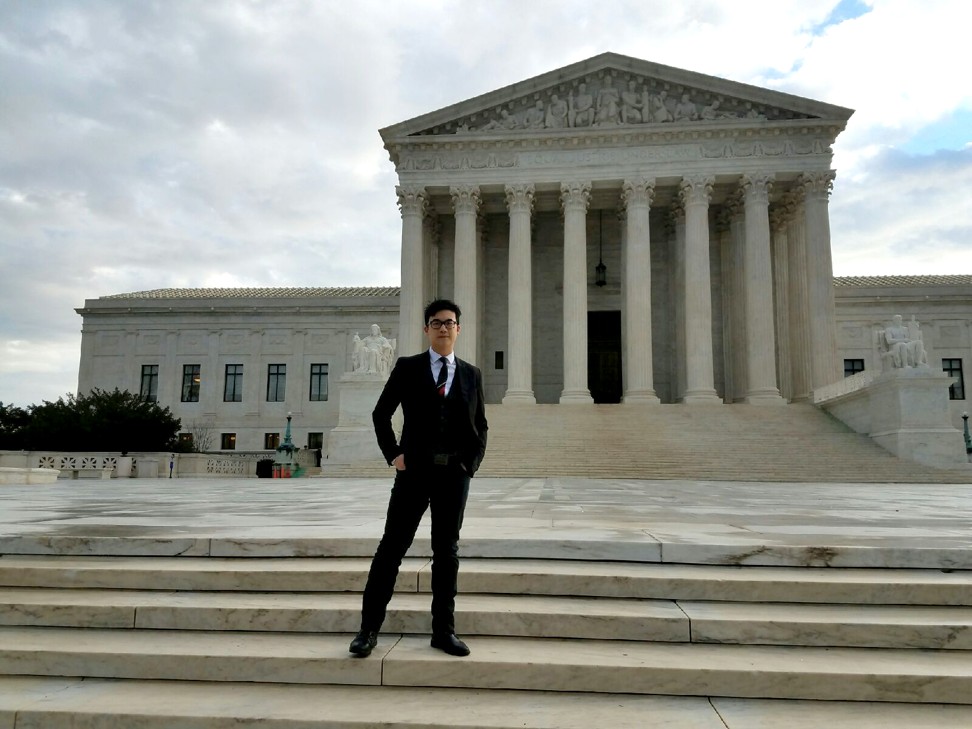
By the autumn of 2015, the case was set to be heard by the Court of Appeals. For Jiang, who had joined the band that summer, it was a baptism by fire.
“I played two shows, and the next thing I knew it was me and Simon on a plane to Washington. There was a publicity machine, there was all this craziness,” recalls Jiang. “I can say for a fact nobody that I knew was either offended for me or at me. Nobody. My mom didn’t really care. She didn’t make the connection. My stepdad, who is Caucasian, he laughed. Most people laugh about the name, and walk away.”
At this point, the story took a twist that threw into sharp relief all the cultural, social and linguistic complexities that arose from Tam’s seemingly simple request for a trademark. Essentially, The Slants found themselves on the same side of the argument as the Washington Redskins football team, and its owner Daniel Snyder, who had lost their trademark in 2014 on the grounds that the term “redskin” is a racial slur disparaging to Native Americans. A win for The Slants would also represent a win for the Washington Redskins.
“We don’t support the Redskins,” says Jiang, over a soul-food lunch in Portland’s Kenton neighbourhood. “At the time, Simon and I made it very clear that there’s a big difference […] We’re going to support all the other people that have tried to trademark register their names but have been denied because of their race, or because their intent is misunderstood by the trademark office. If somebody is trying to register a name that’s racially discriminating, we’re not going to support that. Free speech or not, that’s not something we’re going to stand up for.”

Tam, whose pursuit of the case has earned him an impressive degree of expertise with regard to the subtleties of trademark law, takes a considered philosophical view of the implications.
“If we only see social justice as punishing people who do bad things, like Dan Snyder and his football team, then we’re never going to approach justice,” he argues. “Justice is really about equity. That means giving people with the fewest options in life more options, more resources and more of an ability to express themselves. The people most affected were the people similar to us who didn’t have the resources to fight. That was a much greater evil in my mind, and the issue that needed to really be addressed.”
On December 22, 2015, the Court of Appeals ruled in favour of The Slants by agreeing that the disparaging provision of the Lanham Act was unconstitutional because it violates First Amendment rights. The USPTO appealed the decision, filed suit and the case was bumped to the Supreme Court. Tam not only put his celebrations on ice, he also continued to refine the particular blend of creative expression and activism that had underscored his long-running involvement with the thornier aspects of trademark law.
In 2016, The Slants contributed to an album of songs and spoken-word tracks for the Act to Change campaign, organised by The White House Initiative on Asian Americans and Pacific Islanders. Other participants in the project, designed to raise awareness about bullying in schools, included basketball player Jeremy Lin, actor George Takei (best known for his work on Star Trek), as well as Barack and Michelle Obama. In the final run-up to the Supreme Court judgment – seven long years after Tam’s first application to register his trademark – The Slants dovetailed music and politics with a tour titled “The Band Who Must Not Be Named”.
Everyone knows that The Slants is using this term not at all to disparage, but simply to describe
On June 19, 2017, the Supreme Court ruled unanimously in favour of Tam, upholding the earlier decision by the Court of Appeals. Justice Ruth Bader Ginsburg noted: “Everyone knows that The Slants is using this term not at all to disparage, but simply to describe.”
The American Civil Liberties Union (ACLU), a non-profit organisation that had filed an amicus brief (a legal document of relevant insight or information) and provided oral argument to the Court of Appeals in support of The Slants, was clearly delighted that Tam had prevailed. On the day of the verdict, Lee Rowland, a senior lawyer with the ACLU, wrote: “Decades of history have taught the ACLU that freedom of speech and racial justice are inseparable. And The Slants are now officially rock stars of both.”
Not all reactions to the ruling, however, were fully supportive. In a statement released shortly after the verdict, Cyndie Chang, president of the National Asian Pacific American Bar Association, expressed an objection: “The ability of any business or individual to have the exclusive ability to profit from racial slurs using a federal trademark, no matter their intent, has harmful consequences. As current events remind us, Asian Pacific Americans and other communities are all too familiar with the damage caused by racial slurs and epithets. While communities must have the ability to reclaim historically disparaging terms used against them and exercise free speech, today’s decision does not advance those objectives by granting exclusive ownership of a term in commercial settings.”
Chang’s opinion was echoed by the Hispanic National Bar Association and the Native American Bar Association, among other organisations.
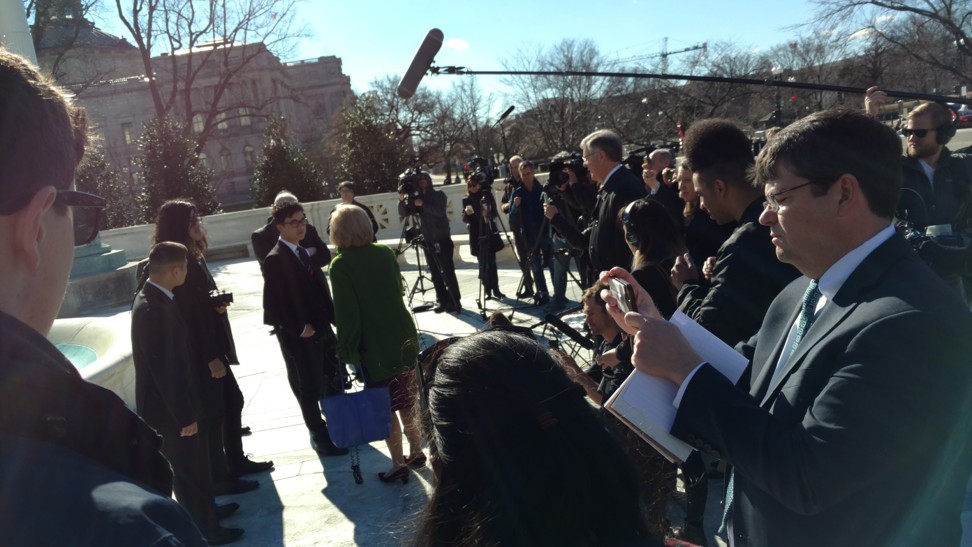
The debate rumbled on in the national media, and The Slants appeared on the popular satirical news programme The Daily Show, which highlighted the ironies and absurdities of the case.
Reaction in the band’s hometown, Portland, was positive.
“I heard about the case on NPR [National Public Radio] and went out and bought their first album – and I still love it,” says Debbie Smith, co-owner of Excalibur Comics, a speciality store frequented by the anime enthusiasts who made up the band’s original fan base.
Jasper Shen, chef and owner of XLB, a north Portland restaurant specialising in xiaolongbao, still values the conversation about language and identity prompted by The Slants’ case.
“I read about the decision and I thought it was interesting because it opens up a lot of questions about who gets to use what language,” says Shen, an Asian American with Taiwanese roots. “It’s an important question for anyone of colour. Language has been such an important part of racism, and equality. There are a lot of slippery slopes we could start falling down when we start thinking about who gets to use what language, and when it’s appropriate. It wasn’t just an Asian-American thing for me. I honestly thought it was good that they won.”
People assume when you say ‘free-speech rights’ that it’s the right to offend. But it’s much more nuanced than that
Reflecting on the case, Tam notes that his views on its impact and significance have, to some degree, evolved.
“It started out as a discussion about reappropriation and the ability to reclaim racial slurs. And it was really about who got to control those ideas,” he says. “Over the last two years of the case the conversation shifted because that’s when arguments about freedom of speech started being a part of everything. Often times, people assume when you say ‘free-speech rights’ that it’s the right to offend. But it’s much more nuanced than that, because people can offend all the time, whether they have a trademark or not.”
The more Tam thought about laws governing freedom of expression, he says, the more he understood about the way they are applied. “More often than not those laws are enforced against marginalised communities, people with a minority opinion and people who don’t have the power or resources to fight. Because of that I realised how important it was for us to continue fighting.”
Last year, the band started a non-profit organisation, The Slants Foundation.
“We’re using our platform to raise money for scholarships for kids who want to incorporate activism into their art,” says Tam.
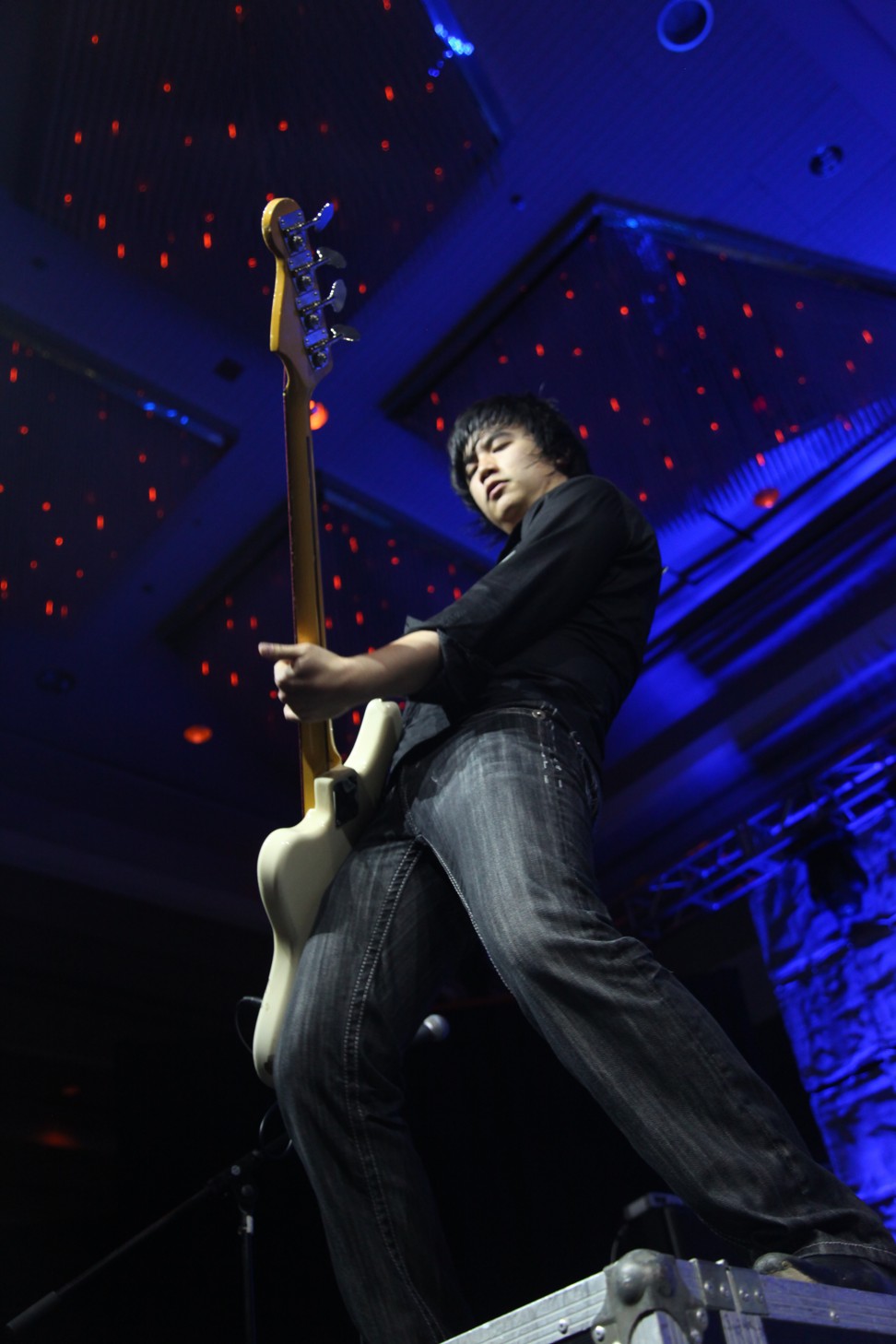
For Jiang, the foundation is a way to retain the momentum generated by the Supreme Court ruling.
“Now that the case is over, let’s give back to the community. Let’s help somebody else out,” he says.
As The Slants continue to make music, Jiang is reminded of the band’s place in legal history on a regular basis.
“I didn’t realise this case meant so much to a lot of people. We [perform at] a lot of lawyer events, and I’m amazed by the emotional response I get: ‘You guys are with The Slants? Holy moly that’s the biggest case. I went to law school and I studied you guys in my class. You’re in my textbook.’ It’s incredible.”
Just as remarkable for Jiang as the extent of the case’s repercussions is the fact that Tam was willing to go through the financial strain of seven years in litigation.
“There were multiple points where we had to take on credit-card debt just to keep us going,” Jiang says. “I’ve worked with people who are very driven but Simon has a focus. Some might say he’s stubborn. But it’s not always about being right or wrong. He just feels if there’s some injustice in the world, he needs to go out and try to solve it. He feels there’s a reason to do this beyond publicity. And, in fact, a lot of times it hurt.”
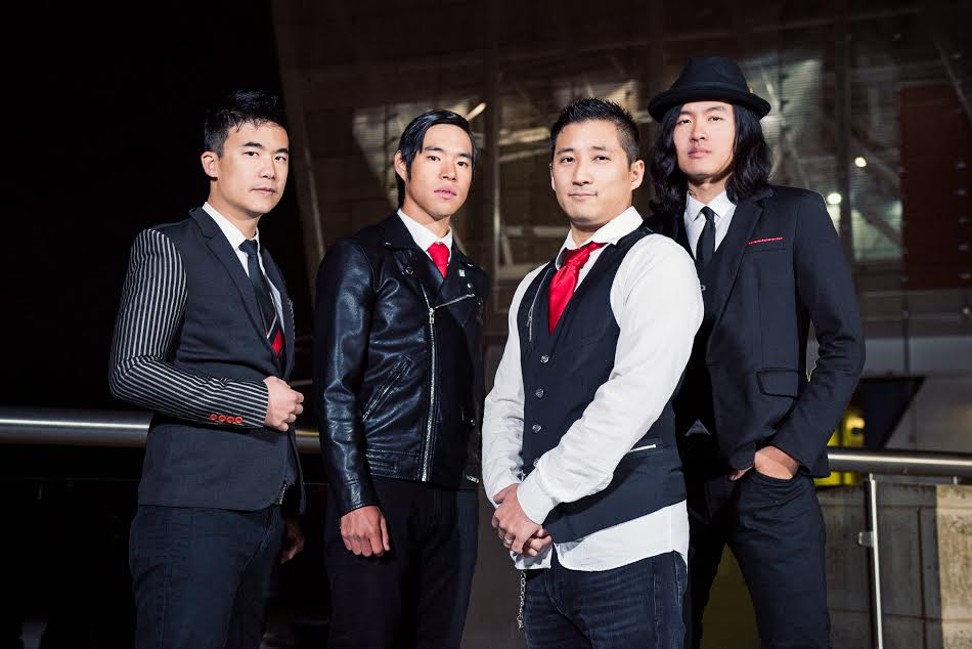
There’s a chance that The Slants may be remembered only as the Asian-American band who took their trademark case to the US Supreme Court and won, but there are also signs that they may be onto something more lasting and substantial. By building music and activism into The Slants’ agenda, Tam has placed himself ahead of the curve, given that youthful activism is a significant part of the current American zeitgeist. The Slants have connected with something more broad than the specifically Asian-American context that raised their profile.
“Every day I get notes from kids who are inspired by our work, who identify with our stories of being bullied and fighting and standing up for ourselves,” Tam says. “To me that’s provided so much more satisfaction and reward than anything else.”
Activism, it can be argued, is the new rock ’n’ roll. In the wake of the Marjory Stoneman Douglas High School shooting, in Florida, in February last year, in which 17 people were killed, young activists began a drive to reform gun control that captured international headlines. In February this year, a group of schoolchildren from the Sunrise Movement confronted California senator Dianne Feinstein and did more than simply express the conviction of their beliefs about climate change – they also made a generational statement about their willingness to engage in the debate. The current groundswell of activism among the young in America – and around the world – has drawn comparisons to the wave of protests that characterised the 1960s counterculture, a movement in part defined by the politically influential music it produced.
However, the structure of the music industry and the media landscape have changed dramatically since the heyday of Bob Dylan and The Beatles. In the fractured age of digital media and social media, contemporary rock music no longer has the impact, platform or shock value it once possessed. While runaway success in the music industry is more elusive than ever, it is now much easier to build – and maintain – a core following through digital channels. Surprisingly, though, The Slants don’t have a big social-media presence: there are thousands of fashion and lifestyle influencers who dwarf their “follower” statistics on Instagram and Twitter.
“Would it be great if we had all those followers? Sure. But that’s not what I put my stock in. Our audience tends to be a little bit more specific,” says Tam. “Exposure does not always equate to engagement. I go to a lot of places and people say they’ve heard of us and love what we do, but it doesn’t automatically register in their minds to follow The Slants across all these channels. We didn’t get involved with Instagram until pretty late, and most of our social-media equity is on Facebook and YouTube. Some of our videos have had hundreds of thousands of views, and that’s always satisfying until you see the royalty cheque for 96 cents. But that’s fine for me. If we can develop a platform that is sustainable, if we can change lives with the work we do, that means much more to me than having a million followers on social media.”
It’s probably fair to conclude that Tam saved The Slants from obscurity by taking his trademark case all the way to the Supreme Court. The band still exist because of his dogged pursuit of the ultimate legal sanction for their name, and they currently average 150 to 200 performances a year, on top of making and releasing new music. When they tour through Boston in May, their venue of choice will not be a rock rebel’s staple such as the House of Blues or the Paradise Rock Club – instead they are playing the Brown Rudnick Reception at the International Trademark Association’s 141st Annual Meeting.
The significance of The Slants lies somewhere between the dilution of rock ’n’ roll and the rebirth of activism. They are not protest singers in the traditional, folkish 20th-century mould that shaped the likes of Dylan. Nor are The Slants widely followed musical superstars who dabble with social activism: they have never had the degree of exposure associated with the likes of Bono, Neil Young and John Legend, for example. However, Tam has weighted his pop-cultural brand with an ideology – a desire to champion the overlooked and the under-represented – so that the message has become way more significant than the medium. What could have been a relatively obscure rock band that dissolved, like so many others, into humdrum middle age, has become the vehicle for a lifelong mission.
“I truly believe that art is a form of activism,” says Tam. “So when we’re writing and playing music, that’s still supporting this vision of trying to change the world. If we’re very intentional about it we can incorporate it into everything we do. Both artists and activists look at the world and they don’t see it for what it is, but what it could be. And what it should be.”

